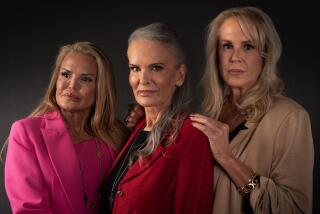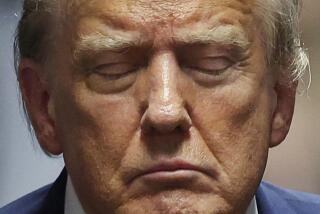Putting His Best Face Forward
When O.J. Simpson first appeared in court early this summer, he was a dazed-looking murder suspect, not even permitted to wear a tie because his jailers feared he’d commit suicide.
But this week, as Simpson’s trial got under way with jury selection, he became the old O.J., the confident-looking former football hero who sold America on Hertz rental cars and was a favorite of wealthy friends and business associates at country clubs across the nation. He smiled at potential jurors, softly sang a show tune from his seat at the defense table and later actually chatted with reporters for the first time.
Such a stunning transformation in a defendant’s courtroom demeanor is not unusual and is often part of a carefully considered strategy.
Defense attorneys work hard on the persona of their clients to elicit some degree of sympathy, or at least understanding, from the jurors. A street killer, for example, may appear in court in corduroy sport coats and charcoal slacks, looking a bit like a college teaching assistant.
When attorney Karen Ackerson represented Henry Keith Watson, one of the men convicted of beating a motorist at the intersection of Florence and Normandie avenues during the riots,she undertook a major makeover of her client.
His appearance changed from that of a sullen-looking thug to a friendly, approachable person. She got him to shave his beard and wear conventional sport clothes. “I told him, ‘You have to work with us. We are asking you to change your appearance a little bit and be more presentable,’ ” she said.
Ackerson credits the strategy with helping Watson obtain a jury deadlock, leading prosecutors to offer him a lighter sentence than was widely expected after his arrest.
Such image changes are “enormously important,” agrees Terri Waller, managing partner of the National Jury Project, a jury consulting firm.
In fact, she said, a defendant’s image is so important that “the trend in California is that most defendants don’t appear in shackles. The courts have acknowledged that it creates an unfavorable image that the defendants are dangerous.
“When talking about serious crimes,” she said, “there is no doubt the jurors are trying to figure out the defendant, trying to figure out what kind of a person he is. Is he the kind of person who would have committed this crime?”
*
Simpson’s lawyers faced a different task. He’s well-known and had always been well-liked. The challenge facing the Simpson team, said Waller, was not to invent a new O.J. but to remind us of the O.J. we loved. “There is a certain amount of humanizing there to do,” she said.
The humanized O.J. emerged this week when Superior Court Judge Lance A. Ito and prosecution and defense lawyers began screening prospective jurors.
By chance, I got an inside account of what it felt like to be on the receiving end of the more buoyant Simpson. A family friend happened to be one of the juror candidates and volunteered her story to me. It turned out she couldn’t serve, but her brief brush with the case left an impression--the kind the defense hopes will be shared by those who make the final cut.
“I was the second one to be questioned,” she said. “When it was my turn they took me to a partitioned area. I was nervous. I was tense. The atmosphere in the room was overwhelming.”
She said Simpson was at the opposite end of the table from her. At first, her attention was occupied by the judge, who was asking her questions about whether she could serve on the panel. When Ito finished, she said, “I turned forward. He (Simpson) was looking at me. We made eye contact a couple of times.
“He was gorgeous,” she said, adding that she felt, in some way, connected to him. “Here he was, a real, tangible person.”
*
Simpson’s courtroom metamorphosis began soon after the suicide watch was lifted. He began appearing in court in a tie that went perfectly with his expensive dress shirt and nicely tailored, conservative suit.
On the day of his Superior Court arraignment, his unsteadiness had been replaced by high energy. Instead of routinely entering a “not guilty” plea, he announced in an assertive voice that he was “absolutely, 100% not guilty”--not coincidentally providing the media with a perfect sound bite. He started taking notes in court, looking like he was on top of everything. He also started to occasionally smile and talk to his lawyers.
But it was not until this week that the transformation seemed complete, when he began quietly singing to himself the song “Memory” from the Broadway hit “Cats.”
He sang just a few words, but enough to send a message to the many who tear up when they hear the music from the sentimental, wildly popular production. The song ends like this:
“Touch me, it’s so easy to leave me. All alone with the memory of my days in the sun. If you touch me, you’ll understand what happiness is. Look, a new day has begun.”
The next day, Simpson told reporters covering the jury selection: “That song really gets to me because it says ‘touch me’ and I can’t touch my kids.”
With that simple explanation, Simpson reminded people that he was a father and simultaneously re-established his contact with the press, which he had always cultivated.
The next day, Simpson talked to the press again, this time sounding like the friendly jock who was always good for a post-game interview. “I’ve got to watch what I say to you guys,” he said. “If I say it, I know I’ll read it tomorrow morning.”
*
The prosecution has a job, too. They must establish the image of two people who are not in the courtroom.
With the incessant media concentration on Simpson, the prosecutors must make the presence of Nicole Brown Simpson and Ronald Goldman felt. Through testimony, pictures and their own oratory, Marcia Clark and William Hodgman will recall the victims’ young lives and their bloody deaths. They will burn the image of Nicole Simpson, the mother, into the minds of the jurors, countering the constant presence of Simpson.
This battle of images will be a powerful force in determining the outcome of O.J. Simpson’s murder trial.
More to Read
Sign up for Essential California
The most important California stories and recommendations in your inbox every morning.
You may occasionally receive promotional content from the Los Angeles Times.









